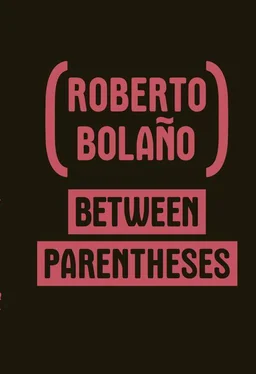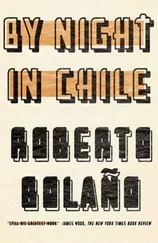Roberto Bolaño - Between Parentheses - Essays, Articles and Speeches, 1998-2003
Здесь есть возможность читать онлайн «Roberto Bolaño - Between Parentheses - Essays, Articles and Speeches, 1998-2003» весь текст электронной книги совершенно бесплатно (целиком полную версию без сокращений). В некоторых случаях можно слушать аудио, скачать через торрент в формате fb2 и присутствует краткое содержание. Год выпуска: 2011, Издательство: New Directions, Жанр: Публицистика, Критика, на английском языке. Описание произведения, (предисловие) а так же отзывы посетителей доступны на портале библиотеки ЛибКат.
- Название:Between Parentheses: Essays, Articles and Speeches, 1998-2003
- Автор:
- Издательство:New Directions
- Жанр:
- Год:2011
- ISBN:нет данных
- Рейтинг книги:4 / 5. Голосов: 1
-
Избранное:Добавить в избранное
- Отзывы:
-
Ваша оценка:
- 80
- 1
- 2
- 3
- 4
- 5
Between Parentheses: Essays, Articles and Speeches, 1998-2003: краткое содержание, описание и аннотация
Предлагаем к чтению аннотацию, описание, краткое содержание или предисловие (зависит от того, что написал сам автор книги «Between Parentheses: Essays, Articles and Speeches, 1998-2003»). Если вы не нашли необходимую информацию о книге — напишите в комментариях, мы постараемся отыскать её.
The Savage Detectives
Between Parenthese
Between Parentheses: Essays, Articles and Speeches, 1998-2003 — читать онлайн бесплатно полную книгу (весь текст) целиком
Ниже представлен текст книги, разбитый по страницам. Система сохранения места последней прочитанной страницы, позволяет с удобством читать онлайн бесплатно книгу «Between Parentheses: Essays, Articles and Speeches, 1998-2003», без необходимости каждый раз заново искать на чём Вы остановились. Поставьте закладку, и сможете в любой момент перейти на страницу, на которой закончили чтение.
Интервал:
Закладка:
Roberto Bolaño
Between Parentheses: Essays, Articles and Speeches, 1998-2003
Introduction
This volume collects most of the newspaper columns and articles that Roberto Bolaño published between 1998 and 2003. Also included are a few scattered prefaces, as well as the texts of some talks or speeches given by Bolaño during the same period. Taken together, they make up a surprisingly rounded whole, offering in their entirety a personal cartography of the writer: the closest thing, among all his writings, to a kind of fragmented “autobiography.”
The starting date, 1998, isn’t arbitrary. Up until then (and despite the critical success of Nazi Literature in the Americas and Distant Star , in 1996, and the short-story collection Llamadas telefónicas [Phone Calls], in 1997), Roberto was a little-known writer who lived in relative isolation in Blanes, a coastal town in the Spanish province of Gerona, north of Barcelona. It was after the publication of The Savage Detectives , in 1998, and the powerful response the novel elicited, that Roberto was given the opportunity to write for various Spanish and Latin American publications, and he began to be called upon to give lectures, write prefaces, preside at book launches, and participate in conferences.
Today, it’s hard to grasp how quickly all of this happened. In fact, the oldest of the pieces collected here — “Who Would Dare?” — is an isolated article that appeared in Babelia , the literary supplement of the Spanish newspaper El País , in January 1998. Less than a year later, Bolaño agreed to write a more or less weekly column for the Diari de Girona . The first was published in January 1999, and from then on, Bolaño — who had begun to acquire a taste for this new kind of writing — continued to publish articles on a fairly regular basis, and also to field a growing number of requests for his presence at different events.
As a result, all of the texts collected here were written in the short span of about five years. It makes sense, then, that the tone should be consistent, that multiple internal resonances should be revealed, and that the pieces should fit together in a natural way, with surprising neatness. In assembling the volume, a strict chronological order might have been adopted. But in the end this was rejected in favor of a more deliberate scheme, according to which the different materials are grouped in six main sections, preceded by a brief “Self-Portrait” and concluding with one of the last interviews that Bolaño gave shortly before he died.
First come three talks or speeches (either term is better than lectures ) delivered by Roberto on very different occasions. The adjective “insufferable” has been attached to all three, deliberately: to underscore the close relationship of these speeches with the two that Roberto himself included at the end of his posthumous collection, El gaucho insufrible (2003) [The Insufferable Gaucho]. “Literatura + enfermedad = enfermedad” [Literature + Illness = Illness] and “Los mitos de Cthulhu” [The Myths of Cthulhu] were surprising because of their aggressive stance, provocatively full of categorical statements. “The Vagaries of the Literature of Doom,” the first of the “three insufferable speeches” gathered here, continues in the same provocative vein; it begins with a discussion of Martín Fierro , the ultimate insufferable gaucho, and is dedicated to the patron saints of post-Borgesian Argentine literature. The other two speeches are somewhat different in character, much more personal. The “Caracas Address” is the text that Bolaño read in Venezuela when his novel The Savage Detectives won the 1999 Rómulo Gallegos Prize. It’s an unexpectedly confessional speech, in which Bolaño makes a public profession of his literary faith and comes to state, with moving seriousness, that “everything I’ve written is a love letter or farewell letter to my own generation.” “Literature and Exile,” meanwhile, reflects on a subject as crucial to Bolaño’s work as to his life; very shortly after giving this speech he faced the intense experience of returning, for the first time in twenty-five years, to Chile, the country of his birth.
“Fragments of a Return to the Native Land” is the title of a long piece that Bolaño wrote upon his return from the first of two trips he made to Chile, at the end of 1998. The same title heads the block of texts that serve as the backbone of this volume. The first was written — like the speech “Literature and Exile” — just before Bolaño’s return to Chile. His first impressions of this trip are very clearly described in the piece cited above, which is wary yet warm in tone, full of humor. Shortly afterward, however, Bolaño published a much darker, more bitter piece in the Barcelona magazine Ajoblanco . It’s the account of a dinner to which he was invited by the Chilean writer Diamela Eltit and her husband, the socialist minister Jorge Arrate, spokesman of the Frei government. The story — recast later in By Night in Chile — was soon making the rounds in Chile and, not surprisingly, feelings were hurt. As a result, when Bolaño traveled to Chile for the second time, in December 1999, the atmosphere was stormy, and even hostile, and Bolaño was shut out by the country’s cultural establishment. This had to happen sooner or later, given Bolaño’s visceral response to Chilean politics and society, as well as culture, and, more specifically, poetry. The texts collected in this section give a good sense of this response. Among them, special mention should be made of the piece on Nicanor Parra, a crucial influence on Bolaño’s work, as is evident in many places. It’s impossible to explain Bolaño’s poetry (and Bolaño, of course, was first and foremost a poet) without keeping in mind Parra’s influence. But the deep effect of the great Chilean poet is also recognizable in Bolaño’s more or less insufferable speeches and his increasingly cantankerous, irreverent, and havoc-wreaking public persona.
The bulk of this volume consists of the columns that, under the heading “Between Parentheses,” Bolaño wrote for the Chilean newspaper Las Últimas Noticias . Their forerunner was the column that Bolaño wrote regularly for more than a year for the Diari de Girona , of the Catalan city of the same name. The staff there, particularly Salvador Cargol, the editor of the arts section, deserve credit for having been the first to think of him as a columnist, when such a thing had never crossed Bolaño’s mind. Starting in January 1999, Bolaño wrote for the Diari de Girona as noted, and continued to write for it for almost a year and a half, until the spring of 2000. Bolaño’s column usually ran alongside the paper’s editorial. There was something humorous, it must be said, about Bolaño sharing space with the Catholic writer Josep María Gironella, once-renowned author of The Cypresses Believe in God and One Million Dead , among many other books. In the end, Bolaño published nearly fifty articles in the Diari de Girona , as well as a number of reviews. The pieces were translated at the newspaper’s offices. Some of the Spanish originals were never found, and as a result those articles are not included here.
Soon after he stopped writing regularly for the Diari de Girona , it was Bolaño himself who, in reponse to an invitation to write a piece for his friend Andrés Braithwaite at Las Últimas Noticias (a venerable Chilean newspaper with a large circulation), proposed a weekly column. Roberto’s correspondence with Braithwaite, full of nudges and in-jokes, makes it possible to follow their planning step by step. It’s worth noting Bolaño’s original proposal, as he described it to Braithwaite in July 2000: “On a different subject: I’ve been thinking that we might publish (emphasis on might ) my one-page articles that have only appeared in Catalan, along with some other completely new things. These are pieces on writers, occasionally on European and American movies and artists. They’re yours if you want them. Let me know if you’re interested [. .] I could make it a weekly column (there are more than forty already written).”
Читать дальшеИнтервал:
Закладка:
Похожие книги на «Between Parentheses: Essays, Articles and Speeches, 1998-2003»
Представляем Вашему вниманию похожие книги на «Between Parentheses: Essays, Articles and Speeches, 1998-2003» списком для выбора. Мы отобрали схожую по названию и смыслу литературу в надежде предоставить читателям больше вариантов отыскать новые, интересные, ещё непрочитанные произведения.
Обсуждение, отзывы о книге «Between Parentheses: Essays, Articles and Speeches, 1998-2003» и просто собственные мнения читателей. Оставьте ваши комментарии, напишите, что Вы думаете о произведении, его смысле или главных героях. Укажите что конкретно понравилось, а что нет, и почему Вы так считаете.












